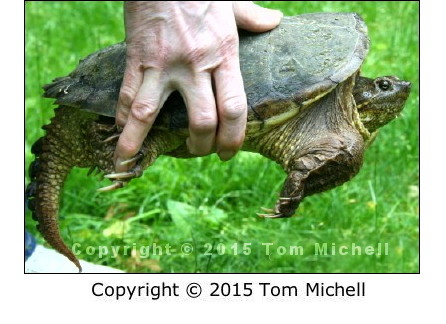
Turtle time isn’t shown on the calendar, but in northern New York it begins sometime in May and lasts till the first snowflakes fly. In more temperate parts of the country, it lasts even longer. And what is “turtle time”? The season of the year when you’re likely to see a turtle crossing the road.
If you’re looking for them, that is. Cyclists are. At least some of us are. And many of the turtles we see have already been crushed by a speeding car. The reason is simple. A turtles-eye view of the road isn’t more than a few inches off the pavement. Not great. Turtles aren’t great sprinters, either. So what they don’t see can easily kill them.
Come to think of it, cyclists and turtles have a lot in common. We’re soft targets. Easy roadkill. Maybe that’s why some cyclists like to give a helping hand to any turtles they see in the road. I suppose you could…
Call Us Turtle Taxies. And just like taxies, we help our fares get to their destinations, quickly and safely. It’s not a job to be undertaken lightly, however. London cabbies don’t get a license until they’ve memorized every byway and back street in that great city. It’s called The Knowledge, and it can take years to acquire. Would-be turtle taxies also need their own version of The Knowledge. The precepts are pretty simple:
- Be safe. You’re no use to turtles if you become roadkill yourself.
- Handle with care. It’s easy to hurt a turtle, and some turtles can hurt you. Don’t let either of these things happen.
- Take your fares where they want to go, not where you think they ought to go.
- Help the injured, if you can.
That’s the short course. Now let’s take a closer look:
Be Safe. Anytime you step into the road, you’re taking your life in your hands. So stay alert, and weigh the risks carefully. If you can’t help a turtle get across the road safely without endangering yourself, leave him to his fate. She might get lucky, and anyway, you’re no good to anyone dead. (Why “she”? Because most of the turtles you see on the road are females who’ve either just laid eggs, or who are looking for a place to do so.)
Handle Turtles With Care. All turtles will struggle and claw when picked up. Snappers will snap. That said, even large snappers can be lifted and carried safely. The photo at the head of this page shows how to do it. Keep the turtle’s head pointing away from you, and hold him well away from your body, but close to the ground. Expect to kicked and clawed. (Sturdy gloves are essential Turtle Taxi kit.)
Don’t attempt to move a turtle you can’t lift easily. A turtle is easily injured if dropped. And never, ever, lift a turtle by his tail. Doing this can cause permanent paralysis.
Take your fares where they want to go. Turtles don’t leave the water without good reason, and they have a destination in mind. When you first see a turtle, she’ll be heading somewhere. Don’t turn her around or carry her off to someplace else. Just help her across the road in the direction she was heading, put her on the verge, and go on about your business.
Helping the injured. Treating an injured turtle is a job for an expert. The best you can do is to place your patient in a container that excludes light but admits air and transport her to the nearest wildlife rehabber with the necessary expertise. To make the rehabber’s job easier, collect any fragments of carapace or plastron that you can find, and take them along,
That’s it. Are you still interested in…
Becoming a Turtle Taxi? I hope so. It’s not a job for the faint of heart, I know, but cyclists are made of sturdy stuff. So why not sign on? Keep your eyes peeled as you ride, and be prepared to give any turtle in the road whatever help you can.
Want to learn more? You’ll find detailed guidance in “Help Turtles Cross Roads.” It was compiled with the assistance of turtle expert and rehabilitator Kathy Michell of the New York Center for Turtle Rehabilitation and Conservation, Inc. (Her son, Tom, took the pictures.) By following her advice I was able to help several large snappers safely across the road last year, and neither they nor I suffered any injury in the process.
Our heartfelt thanks go out to Kathy and Tom Michell and to turtle taxis everywhere. These ladies in the photo spread below may not be able to thank you for the help you’ve give them, but we can—and we do.
Questions? Comments? Just click here!
